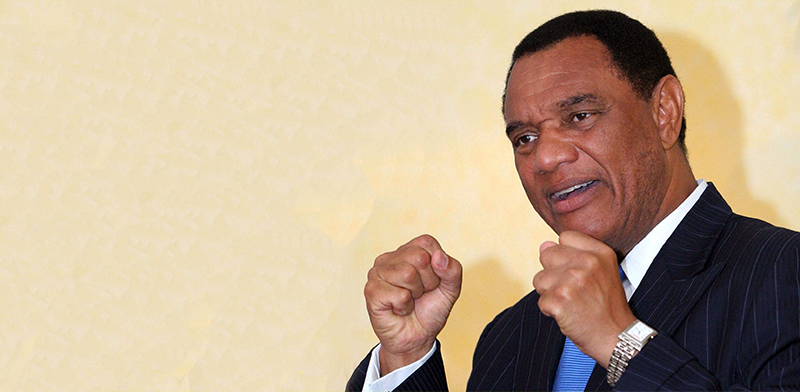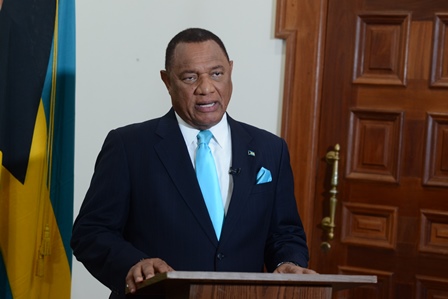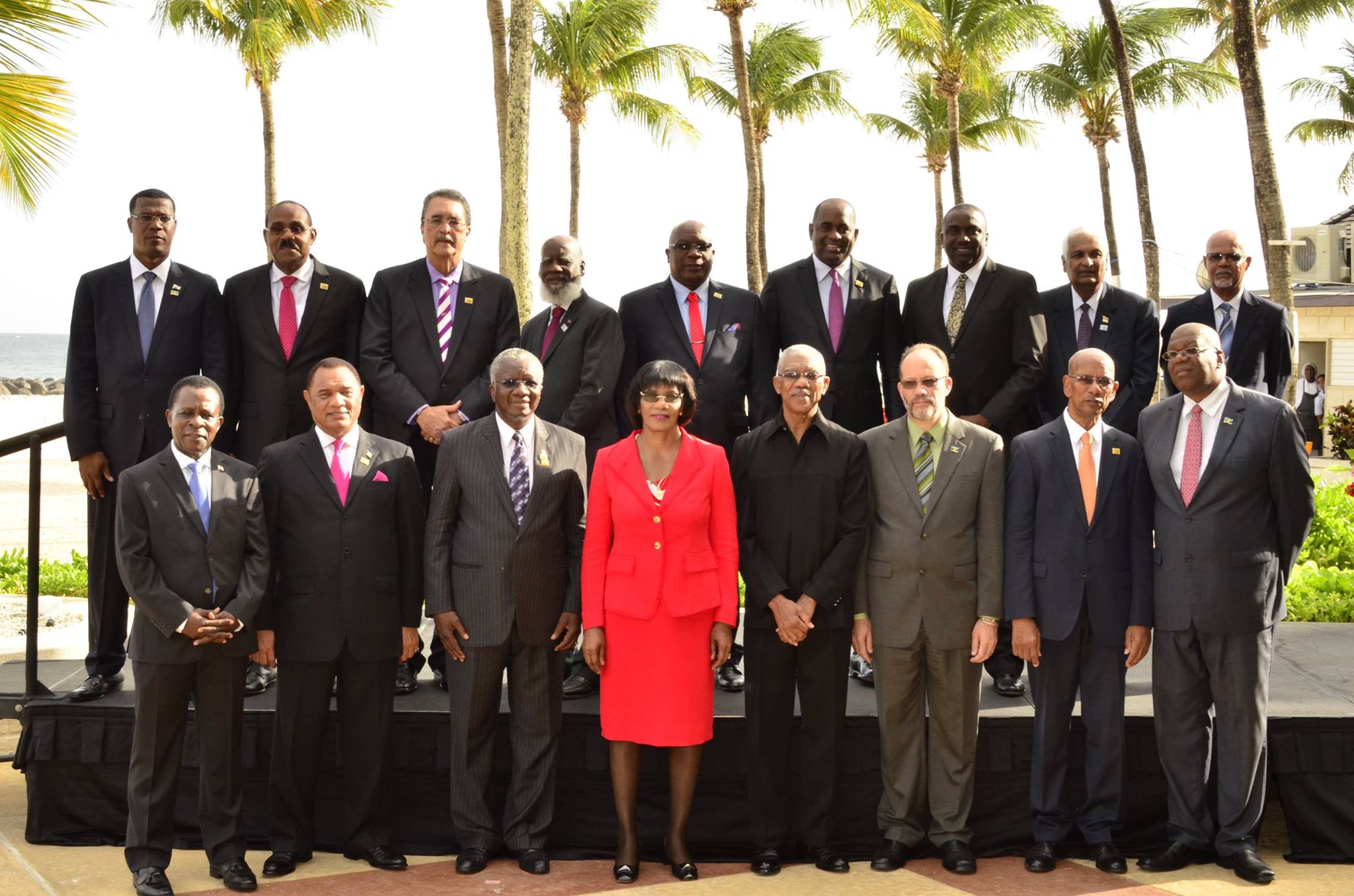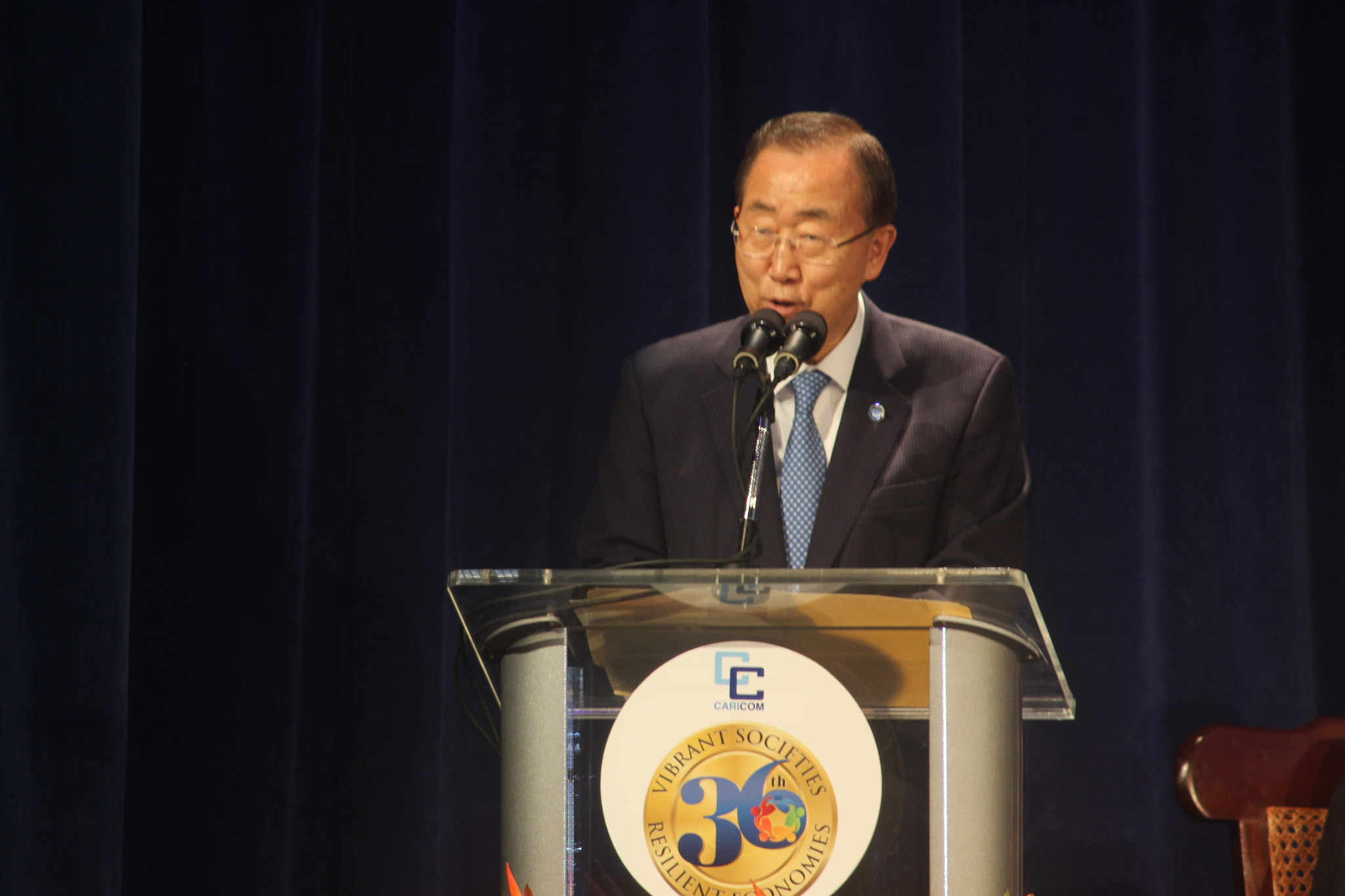I am pleased to be back in Barbados for this formal handing over ceremony of the Chair of the Caricom Community. It has been an honour and a privilege for The Bahamas and for me personally to have served as its Chair. I now pass the mantle onto the distinguished Prime Minister of Barbados. I am certain that the community will be in excellent and capable hands.
I congratulate the new Heads of Government and Heads of State to this forum and join in welcoming them. I pledge to work with all of you for the betterment of our community.
Colleague Heads
As I recall all that was done for and on behalf of the Community over the past six months, I hope that my chairmanship is remembered as a time of progress for the region. The pace has been breathless and the range of issues infinite and complex. As a community though, in the words of the poet, we have miles to go before we sleep.
Colleague Heads
I wish to apologise for having to do so but I must leave immediately after the delivery of this address. It is an interesting facet of the job we all have that we can never predict what events will unfold, what new challenge will come before us. Each time we think that the road seems clear; before you know it there is a bump in the road. That is what faces The Bahamas today. It is imperative therefore for me to return home as quickly as possible.
When you visited Nassau in February, we met in an atmosphere in The Bahamas that the US three billion dollar hotel project was nearing completion. Thousands of jobs were riding on that fact. Sadly events in the last few days have caused us to pause. The developer without notice filed for bankruptcy under the laws of the United States.
This shows the complexity of our regional international relations and the international nature of our economies. In our case, it involves US bankruptcy laws, Chinese capital and construction expertise, Bahamian assets. We are therefore now at a critical time which requires the superintendence of the government.
The more general lesson for us all is that no matter how people speak of new models for development in our region, at the end of the day, the entity of last resort, the entity that must step up to the plate when all else fails is the government. I have never shirked from that fact throughout my public life and I pledge that in this case, my government will see it through.
When we tell our international partners that GDP per capita should not be the sole determinant for the question of the economic support that is to be given our region but that they must take into account the vulnerability to economic shocks, the instant example is illustrative. A single large investor can when it collapses throw an entire country out of whack. Similarly, one hurricane can wipe out the GDP of an entire country three fold. We must continue the fight on this issue and it is certainly the message that The Bahamas will take to Addis Ababa next week and to Paris in December.
I want you to know that I wish you all well for this meeting. I wanted to be here to show our country’s profound respect for the Caricom enterprise. I wanted to leave some ideas that I believe require continued attention for the betterment of the region.
Colleague Heads
Chief amongst my concerns and that of The Bahamas is the future of the young people of our region and our country. This most recent event pains me greatly precisely because of the threat to 2500 hundred jobs for young people just taken onto the work force and 3,000 more who had anticipated entry into the workforce by the end of the summer.
At the conclusion of our Twenty-Sixth Inter-Sessional Meeting, we committed to pursuing the potential of cultural and creative industries and education. We noted that according to the CARICOM Commission on Youth Development, youth are the backbone of the creative industries in CARICOM, both as consumers and producers and that youth under 30 years of age constituted as much sixty per cent of the Region’s population.
Colleague Heads, our youth are looking to us to help secure their future and dispel their sense of hopelessness. We cannot surrender them to crime and criminality.
I repeat we cannot surrender our youth to crime and criminality.
It is our responsibility to ensure that they get a good education, become part of the formal economies of our countries and become beneficiaries of the practice of social mobility, equity and fairness.
Additionally, in our teaching methodologies, we must embark on programmes to focus on raising the educational attainment amongst the bottom 50% in the school system, imploring our educators to find progressive and innovative ways to meet the learning needs of every child.
I have reiterated this point in a number of fora, and that is, if we fail our youth, we do so at our peril.
CARICOM-US relations
Colleague Heads,
Within the margins of the CARICOM-US Summit that was held on 9th April 2015 in Jamaica, the President of the United States, Barack Obama, shared our vision for youth development, citing that, ‘where spirit, innovation, boldness of the youth could be channeled in a positive direction, countries are successful.’
The US President pledged to follow-up on a number of issues raised by Heads of Government relating to trade, finance and security. We must ensure that we follow up from our end as well.
Within the margins of the CARICOM-US Energy Summit, the Community welcomed the announcement of a shift in US policy with respect to supporting concessional development financing for the Region in the areas of energy, climate change and disaster management.
G8 & G20 countries as well as international financial institutions must be made to understand that financing eligibilities cannot be based on GDP per capita without a review of the unique vulnerabilities of a small island developing state.
Black-listing of the Region
Similarly, Colleague Heads, our advocacy mechanisms will be called into high gear to address the ill-advised classification of Caribbean countries by the European Commission as non-cooperative jurisdictions. This pronouncement came as a shock, in view of the fact that a number of CARICOM territories, The Bahamas included, has sought to adhere to every global legislative and regulatory stipulation imposed upon their territories.
One of my final duties as Chair was to write the European Union to debunk this ill-advised list published by the EU, particularly following a meeting in Europe with them and they never raised the matter at all.
The Organisation for Economic Cooperation and Development (OECD) and the Global Forum on Transparency and Exchange of Information for Tax Purposes, however, have challenged this list, saying that the only agreeable assessment of countries’ cooperation is made by the Global Forum and a number of countries identified in the EU exercise are either fully or largely compliant and have committed to Automatic Exchange of Information, sometimes even as’ early adopters’.
The question remains however, as to who will repair the damage done to our financial service industries by the unfair labeling that drives away potential multi-national company investors?
Colleague Heads, we have to garner our collective efforts and fight hard against attempts to portray this Region as a high-risk area for investment. And fight hard, we must!
We must also agitate against the constant moving of the goal posts of standards thereby offsetting our equilibrium.
International Conferences
Colleague Heads,
Our countries continue to face the existential threat of climate change as we have been designated one of the most disaster prone areas in the world. CARICOM Member States face the additional challenge of building their internal resilience in order to mitigate their inherent vulnerabilities.
It is our hope that we can work together with our international partners to receive favourable outcomes for our countries at the three imminent conferences of: The Third International Conference on Financing for Development; the UN Summit on the Post-2015 Development Agenda; and the UN Framework on Climate Change.
The international development financing landscape has not been favourable to us in recent times, but it is hoped that with the recent pronouncements of some of our G8 partners including the US and Japan, on the topic of GDP per capita determinations, this trend will change.
Prime Minister Stuart,
I have observed with great appreciation, Barbados’ years of dedicated service on the Caribbean Sea Commission. Your nation has played a very active role in pursuing the Caribbean Sea Initiative since 1998 through the UNGA Resolution (63-214) ‘Towards the sustainable development of theCaribbean Sea for present and future generations’ at the UN General Assembly. In the process, the Caribbean Sea Commission was established in 2008 to promote the sustainable use of the Caribbean Sea.
Every Member Head here present will know and agree that the greatest scourge of our time throughout our territories is youth unemployment. Every Member Head here present will know that the most effective economic, social and community program is sustainable employment. When we achieve that, we achieve much, we solve much. There is one part of our CARICOM agenda that I believe holds the greatest promise to address in the short term the problem of youth unemployment.
Long after I will have ended my stint in the Chair, The Bahamas will continue its responsibility for the CARICOM Tourism desk and I wish to pledge to Members that I intend to carry on my time as head of that Desk with as much vigour as I intend to see our tourism responsibilities carried out in the Bahamas through my Minister. That vigour will reflect my strong belief that it is through tourism growth and development that we have a collective opportunity to begin to address our problem of youth unemployment most rapidly.
I know that for some, tourism may be redolent of a part of our history that we would want to keep barricaded. For most of our countries, tourism is the largest earner of foreign exchange. For most of our countries, tourism is the largest employer. For all of our countries tourism absorbs the broadest range of skills of any economic sector. For all of our countries, tourism is the one sector for which there is no such thing as a jobless recovery. The very nature of tourism requires more people to be hired with increasing number of visitors. If unemployment especially youth unemployment is the scourge of our times, there appears to be no better economic sector for us to embrace in leading us closer to the promises that we have made to our lands.
I come to this view not only because of the intrinsic benefits that tourism delivers. I also come to this view because I have become convinced that when we look at the world today and at the various global trading blocs that have been formed and when we examine the various initiatives being pursued by CARICOM, it seems to me that the one natural bloc from which our CARICOM nations have much to gain is the God given bloc accorded us by having within the Caribbean the most salubrious conditions for existence on our planet.
I am convinced that tourism, the largest part of our collective economies and, in most cases, the largest part of our individual economies deserves much more attention at our regional meetings. Further, I am persuaded that tourism development and all that it entails is the fastest path to reducing unemployment in our region and the fastest path to reducing the debt burdens that terrifies upcoming generations. We are supposed to make each generation better. I fear that we are on the brink of leaving the next generation with a much greater burden to carry if we don’t begin to focus on ways to make our natural strengths stronger.
I know about and respect the powerful importance of the Caribbean Tourism Organization (CTO) to which our Ministers of Tourism belong. But it has occurred to me that unless CARICOM, that Caribbean body with the largest gathering of Government Heads of the Caribbean, signals to CTO that tourism is very important to our collective good, they will take their cues from the rarity of discussions about tourism at our CARICOM meetings as the indicator of our true beliefs.
My views are further prompted by what we see happening with the Cuban embargo and the United States. You will recall that it was CARICOM that spoke longest and loudest about the need for that embargo to be removed. In fact, not long after our most recent meeting as a body in Cuba, a meeting that I had the privilege to Chair, the announcement of intent was made by President Obama.
Mr Chairman, I have to tell you that after reading the Paper produced by the Caribbean Hotel & Tourism Association on the likely impact on Caribbean tourism of the reopening of Cuba to travel for United States citizens, I hear their appeal for us to act as a group to take full advantage of the opportunity to our collective benefit. In their recommendation to establish a Caribbean Basin Tourism Initiative, I hear their appeal for CARICOM to act in a more concerted manner. The Caribbean Basin Tourism Initiative promises that our citizens can receive benefits from our collective action that we might not be able to achieve for them as individual nations.
We need to take action to achieve the reciprocal reduction of taxes on airline tickets between the United States and Canada. The present high taxes have the effect of reducing travel rather than increasing it.
I am not suggesting for one moment that we should remove all taxes from airline tickets immediately and invite the United States, Europe and South American countries to do the same. What I am asking is that we examine the likely effects of such a move on employment, on total spending and on tax collection. I do know that a recent PriceWaterhouseCoopers report on the effects of the UK imposed APD on airline tickets has been negative for the UK in terms of jobs and tax collection. While we prefer to believe that our lobbying efforts had some effect, it is clear that some of the adjustments that the UK made to APD is a result of discovering that that ticket tax was counterproductive.
With taxes on airline tickets approaching 65% of the total ticket prices in some cases in the Caribbean, there is an argument to be made that the social and economic benefits to be derived from increased volumes of visitors exceed the taxes removed.
So Mr Chairman, this proposed Caribbean Tourism Initiative deserves some closer examination for the benefit of all CARICOM communities. In line with the authors of the document, the world most tourism dependent region, the Caribbean, should also be seen to be the most tourism competent. We must go further in addressing our air transportation rules, our shipping rules, our regional marketing rules, training and development, etc.
I firmly believe that this could be the beginning of some significant steps in the direction of making things better in the Bahamas and better in the Caribbean.
In closing, Colleague Heads,
It has been an honour and privilege to serve the Caribbean Community and represent its people in various fora around the world. As I take my leave, I simply implore us to preserve the momentum gained on various developmental targets and stand in solidarity against any actions that hinder these achievements or negatively impact the territorial sovereignty and integrity of our jurisdictions.
I pray that God continues to bless the Governments and peoples of the Caribbean Community.
I thank you






